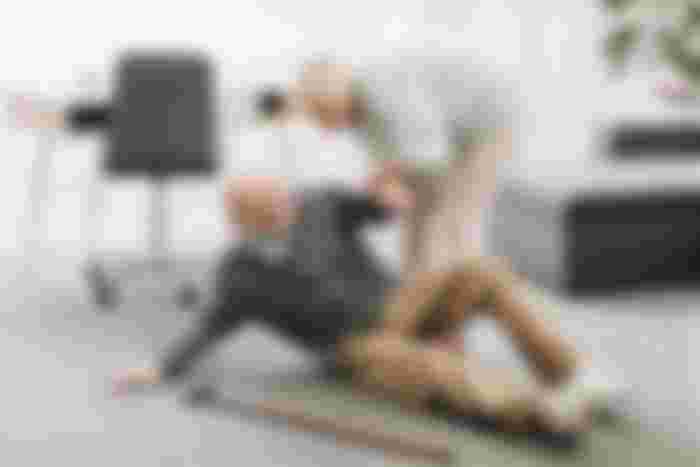We are in a time when the most elementary rules of courtesy are as scarce as the food in Africa: that's how unfortunate, that's how tremendous the problem is. If through a corridor of our workplace, someone miraculously does not run over us when we run past us, far from apologizing, he curses us under his breath for having crossed his path. On the streets, while driving, if we commit something reckless, we do not recognize it but rather grunt some phrase not of courtesy precisely to our road companion.

But the dearth of delicacy in human relationships is not limited to these fields. We have reached the point where lower or upper case offenses go unnoticed by whoever emits them "does not know how to apologize", and what is worse, many times it is also ignored (when someone apologizes), how to accept it.
"Apologizing is gigantic, and even more so being able to receive them" my dad used to tell me many times. As a child I did not understand why admitting a mistake could make me bigger, but very soon I was learning the lesson.

Could it be that as we grow older our pride or ego also increases in volume? Wouldn't it be better then to keep that child within us who forgives easily? When a father reprimands a son, how long does it take for the child to forget? Almost instantly he comes back and says: sorry, Daddy, I won't do it again. "Thus, with that innocence and willingness to make amends, childhood becomes an unforgettable stage. On the contrary, the life of an adult is full tensions and problems that make each day a challenge for the individual, and our social life puts great pressure on us.

Who is not affected by having a disagreement with a family member or a special friend? How many times have we not felt dismayed to be offended by a person we considered special? And how many times does our conscience bother us when we have done or said something that offended a friend? No person can be considered alien to situations like these. So how to solve them?
"Apologizing is not as difficult as it seems"
Of course, admitting a mistake is not always easy. But if we had the time to commit it, we must have the courage to amend it. Why is it so difficult for us to accept our faults? We constantly try to minimize them, to excuse our wrong attitudes. It is much easier to exalt those of others, there we do highlight all the characters ... no detail escapes us. How bad, but how bad we are! To allow this to happen is to let our ego grow, to blind ourselves to a reality: we are all the same.
This acceptance of equality is the first step in being able to apologize. No one is exempt from making mistakes.
To make a mistake, "to screw up is that: to step where we should not, fresh cement, for example, and the footprint is always a footprint. The sensitivity of our fellow men is fresh cement and we do not want to leave traces of our recklessness there. So let's try to carefully erase the untimely passage that "slipped" into that no-go area.
There are a thousand ways to apologize. Sometimes one look can say it all. But when the eyes do not express everything desired, we have a richly extensive language. We are going to make the best use of it! Next time we make a mistake, let's admit it, okay? Let's take a deep breath, a frank look, and a small phrase that can say so much: "I'm sorry." Two words, eight letters, four seconds to say it ... and a friendship that recovers.
Sometimes we have a hard time expressing our feelings verbally.
In those moments, why not resort to the use of pencil and paper? I will never forget a letter that my friend gave me, when we were teenagers and we were upset. What do I know why! When she gave it to me, she stared at me and said: "I hope you read it and meditate on it." It was a very emotional letter in which she alluded to what she appreciated about me, and to all the beautiful moments we had shared. But the part that I was most captivated by the last lines: "Well, friend, I have reached the end of the letter and I have not written what I want to say to you: Sorry! See if it worked, that I forgot the circumstance that motivated that letter. But my friend and her letter, never. If you decide to write a note, deliver it yourself. You make the "live, live, and full color" mistakes. Let us then try to amend them in the same way.

Accompany the envelope with a short but sincere phrase: "I hope you like it", what it says is true or something similar.
How to accept apologies
You may think it is easier to apologize than to accept it, but what if your table companion drops a glass of red wine on your regal white dress? would it be easy for you to excuse it? The mental attitude with which we face problems helps us to solve them better. If we cultivate a positive attitude, we will look at everything from the optimistic angle and our perspective will always be promising. For example, if your table partner does inadvertently spoil your dress ... Think: "This could have happened to me." "He didn't do it on purpose." But if someone intentionally assaults you, tell yourself:
I am important, so much so that I need time and energy to plan this action. In this way, before they apologize to us, our mind will have already prepared the ground to excuse our "aggressor"
Accept the person's sincere regret and make the situation easier and shorter. Don't relive the bad moment, add more details or clarify things further. Help your interlocutor "erase" the episode, not accentuate it. Phrases like "Don't be sorry, it's all forgotten" can be very helpful.

The art of acknowledging our mistakes and excusing those of others makes us giants because not everyone can enjoy the enormous pleasure of keeping friends, gaining a friend. Create friends ... Exquisite gift, unmatched privilege this one of understanding that as humans we have limitations, but we can and have the faculty of reason to notice them and try to rectify them.
Until today, man has conquered what was previously believed unconquerable, discovered inhospitable worlds, unimaginable paths. Why not try to conquer that child that we all have inside of us .. And become giants?




